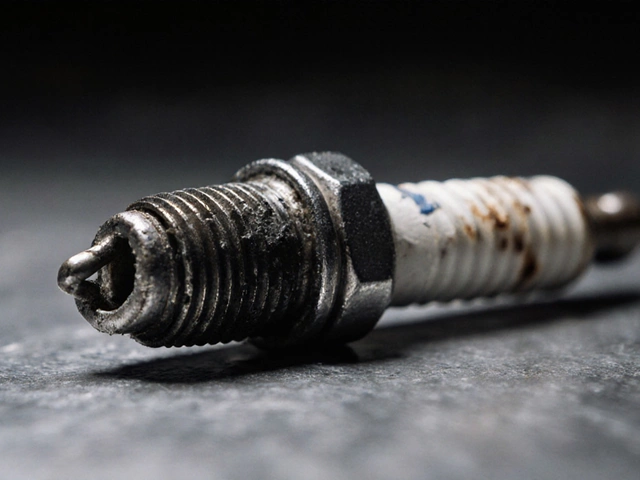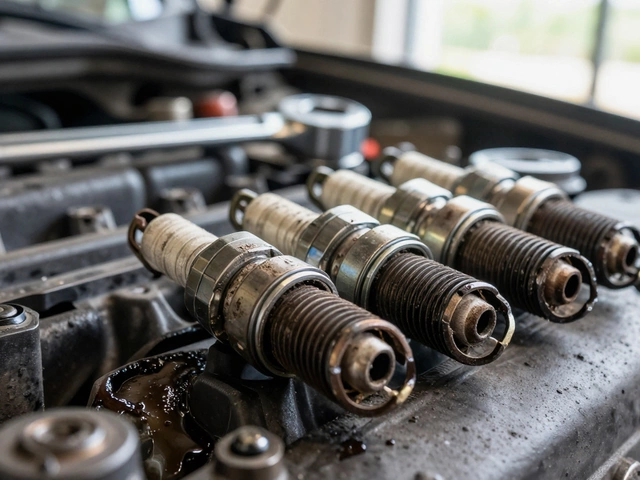Spark Plug Lifespan Calculator
Estimate Your Spark Plug Lifespan
Calculate when your spark plugs might need replacement based on your driving habits, vehicle type, and maintenance history. Results are estimates only.
Estimated Spark Plug Lifespan
Most car owners assume spark plugs are set-and-forget parts-until the engine starts misfiring, sputtering, or refusing to start. That’s when the real question hits: can spark plugs last 10 years? The short answer? Sometimes. But it’s not about time-it’s about driving habits, engine design, and the type of plug you’ve got.
Not all spark plugs are created equal
Back in the 1990s, copper spark plugs were standard. They worked fine but wore out fast-usually around 20,000 to 30,000 miles. Today, most new cars come with iridium or platinum plugs. These are tougher, run hotter, and resist erosion better. Iridium plugs, in particular, can last up to 120,000 miles under ideal conditions. That’s roughly 10 years if you drive 12,000 miles a year.
But here’s the catch: that 10-year claim only applies to modern engines with precise fuel injection, clean oil, and regular maintenance. If your car is older, runs on cheap fuel, or has oil leaks, even the best plug won’t make it past 60,000 miles.
What actually wears out spark plugs?
Spark plugs don’t just expire like milk. They degrade from three main things:
- Electrode erosion: Every time the plug fires, a tiny bit of metal burns off the tip. Over time, the gap widens. Once it’s too wide, the spark can’t jump reliably.
- Carbon buildup: Short trips, rich fuel mixtures, or bad valves let unburned fuel coat the plug. This fouls the spark, causing misfires.
- Oil contamination: If your engine is leaking oil into the combustion chamber (common in older engines), it coats the plug in gunk. That’s a death sentence for any plug.
One mechanic in Manchester told me about a 2015 Honda Civic that still had its original iridium plugs at 112,000 miles. The owner changed oil every 7,500 miles, never drove short trips, and used top-tier fuel. That’s the exception-not the norm.
How to tell if your spark plugs are done
You don’t need to wait for a check engine light. Here are five real signs your plugs are fading:
- Sluggish acceleration: The car feels weak when you press the gas, especially uphill or merging onto the motorway.
- Engine misfires: You feel a rough shake or hear a popping noise from the engine. This isn’t just annoying-it can damage your catalytic converter.
- Hard starting: Especially in cold weather. If it takes two or three turns of the key, the plugs are struggling.
- Worse fuel economy: If you’re filling up more often without changing your driving habits, worn plugs could be to blame.
- Check engine light with P0300-P0304 codes: These codes mean cylinder misfires. Spark plugs are the most common cause.
Some drivers ignore these signs until the car won’t start. That’s when repair bills get expensive. A misfire can cook your catalytic converter-costing £1,000+ to replace.

Manufacturer recommendations vs reality
Most car manuals say to replace spark plugs every 60,000 to 100,000 miles. Some even say 120,000. But those numbers are based on perfect conditions: clean fuel, no oil leaks, consistent highway driving, and no short trips.
In real life? If you live in Manchester and do mostly city driving-stop-and-go traffic, short commutes, damp roads-your plugs will wear out faster. Moisture and unburned fuel build up quicker. I’ve seen iridium plugs fail at 75,000 miles in cars used like this.
Here’s what manufacturers don’t tell you: if you drive under 10,000 miles a year, the plugs still degrade. Time matters. Moisture, temperature swings, and sitting idle let deposits form. A plug that’s 10 years old, even with only 60,000 miles, might be as worn as one with 100,000 miles in a highway-driven car.
What about long-life claims?
Brands like NGK, Denso, and Bosch advertise 10-year or 120,000-mile lifespans. That’s not marketing fluff-it’s lab-tested under controlled conditions. But labs don’t deal with British weather, cheap fuel, or engines with 150,000 miles on them.
Think of it like a tire’s tread rating. A tire rated for 80,000 miles might last that long on smooth highways. But if you drive on potholed roads and brake hard every block? You’ll need new tires in 40,000 miles.
Same with spark plugs. The 10-year claim is a best-case scenario. Real-world performance? Plan for 8 years max if you’re driving normally.

When to replace them-pro tips
Don’t wait for failure. Here’s what works:
- Check every 40,000 miles: A mechanic can pull one plug and inspect it. If it’s black and oily, replace them all.
- Replace at 60,000 miles if you drive mostly city: Even if the manual says 100,000, don’t risk it.
- Replace at 80,000 miles regardless: If your car is older than 8 years, time has done more damage than mileage.
- Always replace in full sets: One bad plug strains the others. You’ll get uneven performance and more wear.
And don’t try to clean old plugs. Scraping off carbon might look clever, but it damages the electrodes. New plugs cost £3-£8 each. Replacing them is cheaper than fixing a damaged ignition coil or catalytic converter.
What happens if you don’t replace them?
Ignoring worn spark plugs doesn’t just hurt performance. It can break other parts:
- Ignition coils: They work harder to force a spark through a wide gap. Burn out faster. Replacement: £100-£200 per coil.
- Catalytic converter: Unburned fuel from misfires overheats and melts the internal honeycomb. Replacement: £800-£1,500.
- Engine performance: You lose power, efficiency, and smoothness. It feels like the car is tired.
One customer in Salford had a 2012 Ford Focus that wouldn’t start after winter. He’d never changed the plugs. They were covered in oil and carbon. Replacing the plugs cost £60. Replacing the catalytic converter would’ve cost £1,200.
Final verdict: Can spark plugs last 10 years?
Yes-but only under perfect conditions. Modern iridium plugs in a well-maintained car driven mostly on highways, using quality fuel, with no oil leaks, and changed every 12 months? Maybe.
For most people? No. Especially if you drive in the UK, where short trips, damp air, and inconsistent fuel quality eat away at plug life. Plan for replacement every 6-8 years, or 60,000-80,000 miles-whichever comes first. Don’t gamble with your engine. Spark plugs are cheap. What they protect isn’t.
Can I drive with bad spark plugs?
You can, but you shouldn’t. Driving with worn or fouled spark plugs causes misfires, which send unburned fuel into the exhaust. This overheats and damages the catalytic converter, which costs over £1,000 to replace. You’ll also lose power, get worse fuel economy, and risk stalling.
Do spark plugs go bad if the car isn’t driven?
Yes. Even if the car sits idle, moisture and condensation build up inside the engine. This leads to carbon deposits and corrosion on the electrodes. A plug in a car that’s driven weekly will outlast one in a weekend toy that sits for months.
Are expensive spark plugs worth it?
For modern engines, yes. Iridium and platinum plugs last longer and provide a more consistent spark than copper. They reduce misfires and improve fuel efficiency. The extra £2-£5 per plug pays for itself in better mileage and fewer repairs.
Can I replace spark plugs myself?
Most yes. You’ll need a socket wrench with a spark plug socket, a torque wrench, and gap tool. Make sure the engine is cold. Remove one plug at a time to avoid mixing up wires. Don’t overtighten-most plugs need 15-20 Nm. If you’re unsure, watch a video for your car model. It’s easier than it looks.
Why do some cars need spark plug changes so often?
Older cars, high-performance engines, or those with turbochargers run hotter and put more stress on plugs. Some European models, like older BMWs or Audis, recommend replacement every 40,000 miles. Always check your manual-don’t assume all cars follow the same rules.


